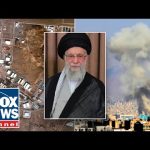The conflict between Israel and Iran has taken a dramatic turn as the situation escalates, sending shockwaves through the Middle East. Recently, central Israel experienced a series of missile strikes that shook the city of Tel Aviv, leaving residents scrambling for safety in bomb shelters. As the explosions rocked the night, reports indicated that while several missiles successfully found their target, thankfully, there were no reported injuries. This was complemented by strong military action from Israel’s defense forces, which took to the skies with 50 fighter jets, launching strikes on 20 targets in Iran, hitting key sites involved in missile production.
In light of the ongoing violence, the Israeli Defense Forces (IDF) made their mission clear: they aim to eliminate threats at the source, specifically targeting Iranian capabilities that have long been a thorn in Israel’s side. Alongside these military efforts, the U.S. Embassy in Jerusalem announced its temporary closure after damage occurred at the U.S. consulate in Tel Aviv. Fortunately, the damage was reported without injuries, but it stresses the rising tensions in a region already fraught with conflict.
The situation has prompted heated exchanges on social media, notably between former President Trump and Iran’s leadership. Trump’s bold declaration of “unconditional surrender” has captured the attention of both supporters and critics. Meanwhile, Iran’s regional proxies, like Hezbollah and the Houthis, are closely monitored as they respond to the deteriorating situation. While the Houthis have launched their own missile strikes in support of Iran, Hezbollah appears to be taking a more cautious approach, likely due to their significant weakening since the onset of this conflict, which has left Lebanon battered with casualties and immense financial damage.
Diplomatic efforts remain critical in this crisis, with discussions centered around ensuring Iran does not escalate its nuclear ambitions. However, time is of the essence, and patience is wearing thin, especially with the Iranian regime’s notorious evasiveness in negotiations. As President Trump weighs his options, he must balance military might with the potential for diplomacy. There’s a strong belief that military action might be necessary to address Iran’s nuclear threats, but American boots on the ground are not favored by many experts in this scenario.
As the tensions rise, the broader implications for global politics are significant, especially regarding how other world leaders, like Putin and Xi Jinping, perceive America’s actions. If the U.S. can effectively manage this crisis, it could send a powerful message of strength across the globe. Iran’s growing stockpile of enriched uranium adds urgency to the situation, as the risks of nuclear proliferation present a looming threat that the Israeli military is working tirelessly to combat. With Israel maintaining aerial dominance over the region, it has become increasingly clear that decisive action is being taken in a struggle that many fear could lead to wider conflict. The coming days and weeks will be vital in determining the trajectory of this difficult confrontation.




